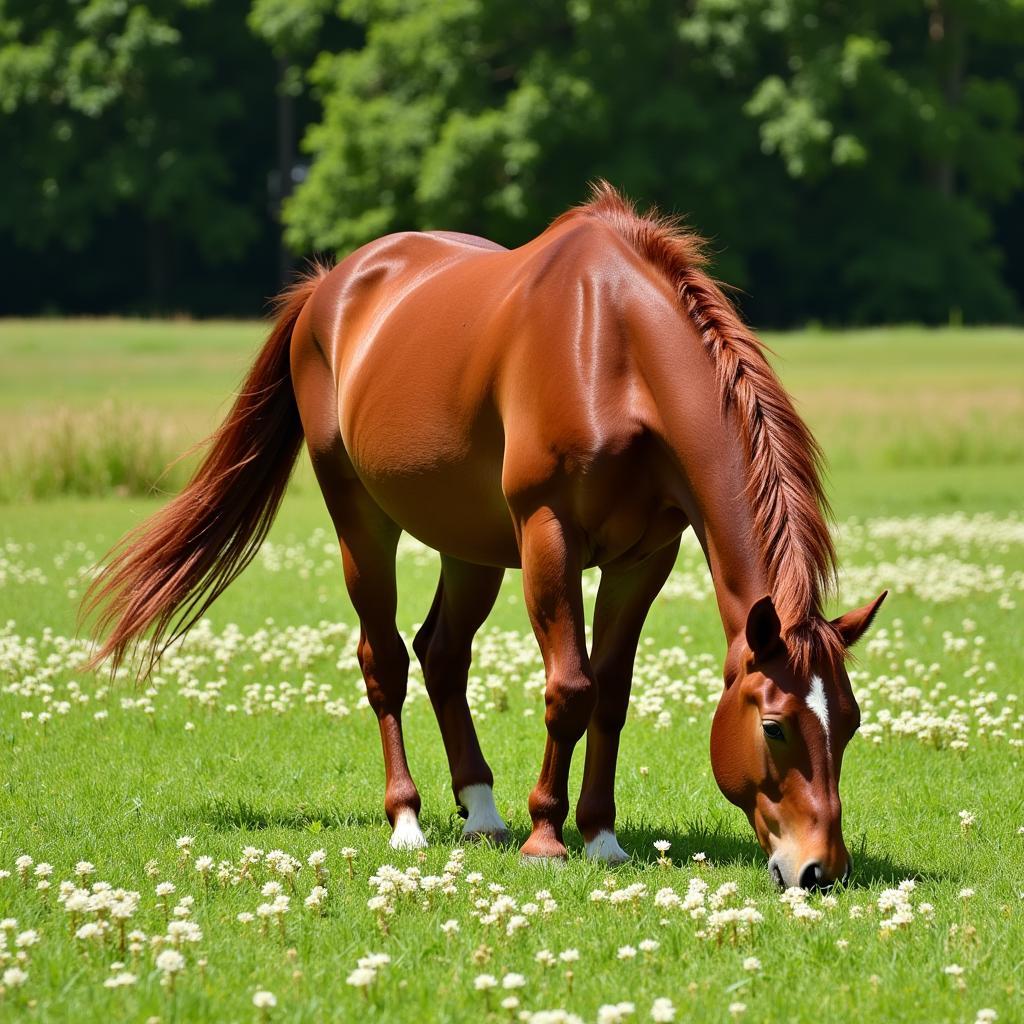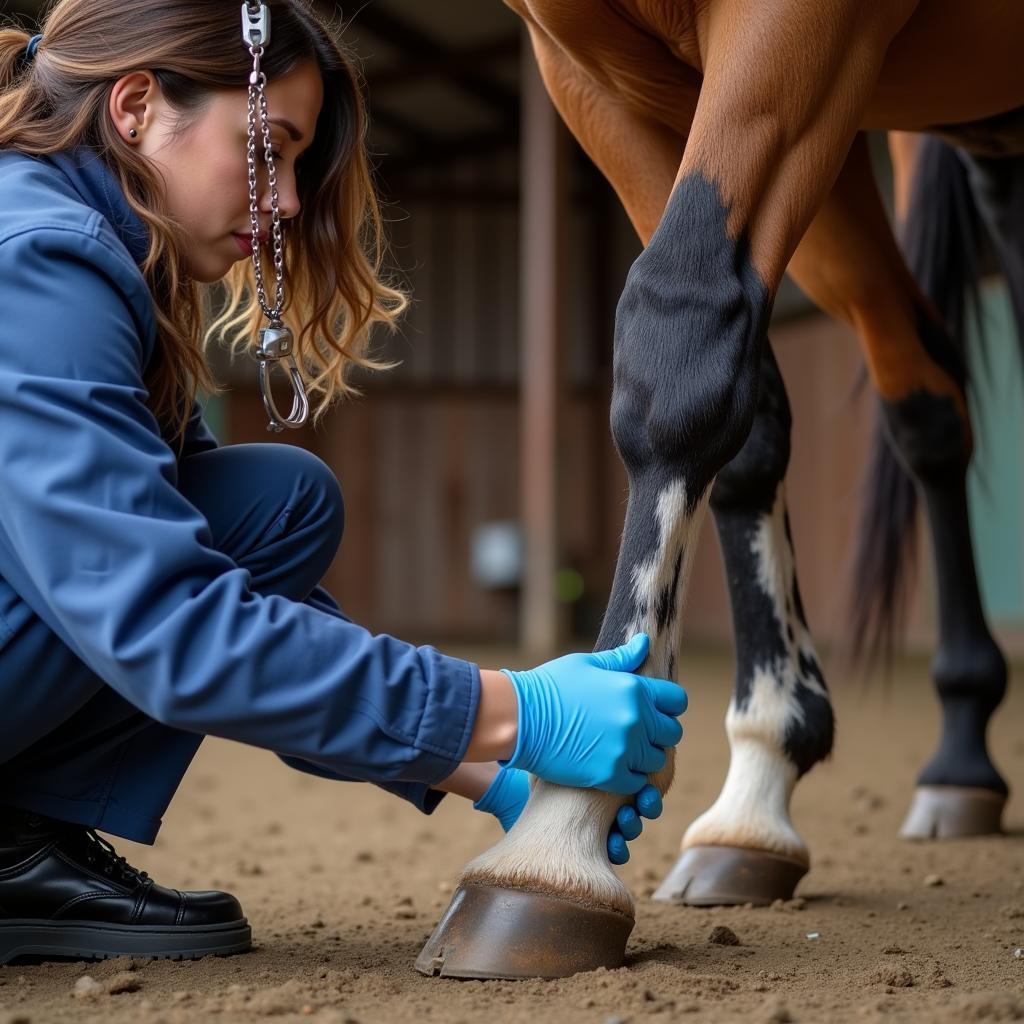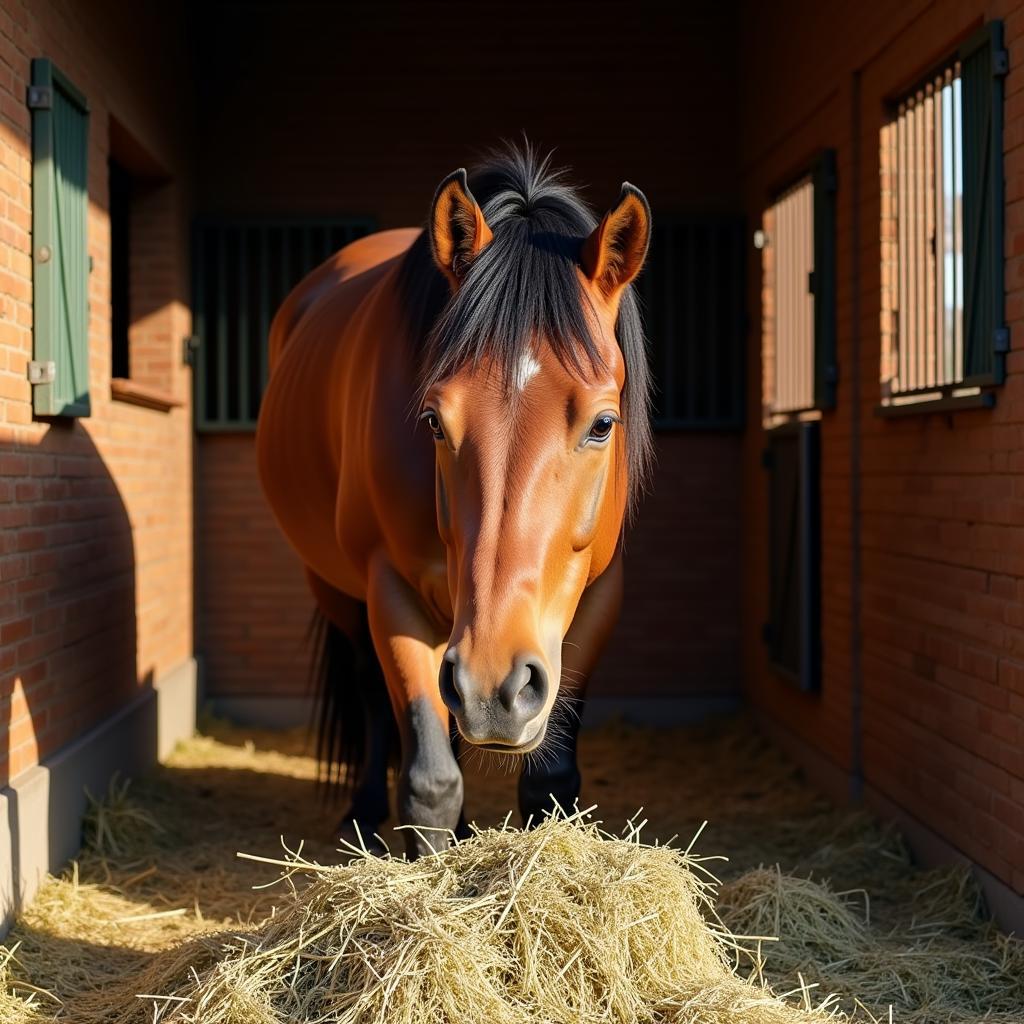Clover, with its vibrant green hues and delicate blossoms, might seem like a tempting treat for your equine companion. However, the question of whether horses can eat clover requires a nuanced answer. While not all types of clover are harmful, some can pose serious health risks to horses. This article will delve into the details of clover consumption for horses, exploring the benefits, risks, and essential precautions for horse owners.
The Allure and Danger of Clover for Horses
Clover is a legume, like alfalfa and soybeans, known for its ability to fix nitrogen in the soil, which can improve pasture quality. It’s a common sight in pastures and can be a valuable component of a horse’s diet in controlled amounts. However, certain types of clover, particularly red clover, contain a substance called coumarin.
Coumarin itself is not overly toxic to horses. However, when red clover is exposed to damp conditions or becomes moldy, the coumarin converts into dicoumarol. Dicoumarol is a powerful anticoagulant that interferes with the horse’s blood clotting ability.
 Horse Grazing in Clover Pasture
Horse Grazing in Clover Pasture
Identifying Different Types of Clover
Distinguishing between different clover varieties is crucial in determining their suitability for horses. Here are some common types:
- White Clover: Generally considered safe for horses in moderation. It’s lower in coumarin than red clover, reducing the risk of blood clotting issues.
- Red Clover: Can be problematic due to its higher coumarin content, especially when moldy or damp. Avoid feeding red clover hay to horses.
- Alsike Clover: Contains a toxin that can cause liver damage and photosensitivity in horses. It’s essential to eliminate alsike clover from pastures.
The Risks of Clover Consumption in Horses
While clover can offer some nutritional benefits, it’s crucial to be aware of the potential risks:
- Bleeding Disorders: The dicoumarol in moldy red clover can lead to severe bleeding problems in horses. Signs include excessive bleeding from wounds, nosebleeds, and blood in urine or feces.
- Photosensitivity: Alsike clover can cause horses to become overly sensitive to sunlight, leading to sunburn, skin lesions, and hair loss.
- Laminitis: Clover, particularly in lush pastures, can contribute to laminitis, a painful hoof condition.
 Veterinarian Examining Horse Hoof
Veterinarian Examining Horse Hoof
Safe Practices for Feeding Clover to Horses
To mitigate the risks associated with clover, consider these recommendations:
- Choose Low-Coumarin Varieties: Opt for white clover pastures and avoid red clover, especially in hay.
- Inspect Hay Thoroughly: Before feeding any hay to your horse, inspect it for signs of mold or dampness, particularly red clover hay.
- Introduce Gradually: Introduce clover into your horse’s diet gradually to allow their digestive system to adjust.
- Practice Pasture Management: Rotate pastures regularly, avoid overgrazing, and control weed growth, including potentially harmful clover varieties.
- Consult Your Veterinarian: If you have any concerns about clover in your horse’s diet, consult your veterinarian for personalized advice.
Recognizing Clover Poisoning in Horses
Early detection of clover poisoning is vital for effective treatment. Be vigilant for these signs:
- Prolonged Bleeding: Excessive bleeding from minor wounds or procedures.
- Lethargy and Weakness: Your horse may appear unusually tired and lack energy.
- Loss of Appetite: A sudden decrease in appetite can indicate a range of health issues, including poisoning.
- Jaundice: Yellowing of the gums, eyes, and skin, particularly with alsike clover poisoning.
If you suspect your horse has consumed a toxic amount of clover, contact your veterinarian immediately.
 Horse Eating Hay in Stable
Horse Eating Hay in Stable
Conclusion
While the question of whether horses can eat clover might seem straightforward, the answer is more nuanced. Understanding the different types of clover, their potential benefits and risks, and practicing safe feeding practices are crucial for ensuring your horse’s well-being. By staying informed and taking appropriate precautions, you can help your equine companion enjoy a healthy and fulfilling life.
Frequently Asked Questions
It’s generally best to avoid feeding horses red clover hay due to the risk of dicoumarol contamination. White clover hay, if sourced from a reputable supplier and free from mold, can be acceptable in moderation.
Is clover good for horses?
Clover can provide some nutritional benefits, including protein and fiber. However, the risks associated with certain varieties, particularly red clover, make it essential to exercise caution.
What are the signs of clover poisoning in horses?
Signs of clover poisoning can include excessive bleeding, lethargy, loss of appetite, and jaundice. If you observe any of these symptoms, contact your veterinarian immediately.
Can horses eat clover flowers?
The same precautions apply to clover flowers as to the rest of the plant. Avoid red clover flowers, especially those that are wilted or moldy.
What should I do if my horse eats too much clover?
If you suspect your horse has consumed a potentially harmful amount of clover, contact your veterinarian immediately. Early intervention is crucial in cases of poisoning.
For further information on horse nutrition and care, explore these resources:
Need personalized advice or assistance with your horse’s diet? Reach out to us at Justus Horses USA!
Contact us:
Phone: 0772127271
Email: [email protected]
Address: QGM2+WX2, Vị Trung, Vị Thuỷ, Hậu Giang, Việt Nam
Our dedicated team is available 24/7 to provide expert guidance and support for all your horse care needs.